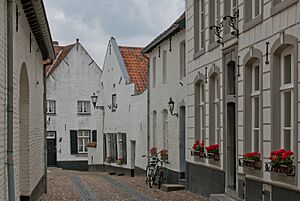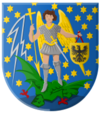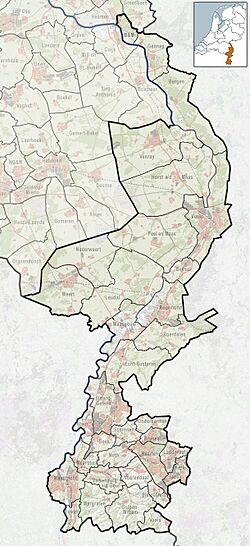Thorn, Netherlands facts for kids
Quick facts for kids
Thorn
|
|||
|---|---|---|---|
|
City
|
|||

The Daalstraat (daalstreet) in Thorn
|
|||
|
|||
| Country | Netherlands | ||
| Province | Limburg | ||
| Municipality | Maasgouw | ||
| Area | |||
| • Total | 6.69 km2 (2.58 sq mi) | ||
| Elevation | 24 m (79 ft) | ||
| Population
(2021)
|
|||
| • Total | 2,490 | ||
| • Density | 372.2/km2 (964.0/sq mi) | ||
| Time zone | UTC+1 (CET) | ||
| • Summer (DST) | UTC+2 (CEST) | ||
| Postal code |
6017
|
||
| Dialing code | 0475 | ||
Thorn (Dutch: [tɔr(ə)n]; Limburgish: Toear or Thoear) is a small, pretty city in the Netherlands. It is located in the Dutch province of Limburg, within the municipality of Maasgouw. Thorn sits near the rivers Meuse and Witbeek. It is famous for its beautiful white-washed brick houses in the town center, which is why people often call it 'the white city'. Long ago, it was part of a special area called the Imperial Abbey of Thorn.
Contents
History of Thorn
From Swamp to Nunnery
A long time ago, the area where Thorn is now was a swamp. It was close to an old Roman road that connected the cities of Maastricht and Nijmegen. Over time, this swampy land was drained.
Around the year 975, a Bishop named Ansfried of Utrecht started a special place here. It was a Benedictine nunnery, which is a type of monastery where nuns (religious women) live and pray.
The Rise of a Mini-State
As time went on, especially after the 12th century, the nunnery changed. It became a 'stift' or convent, but it was no longer just about religious tasks. It became a 'secular' stift, meaning it dealt with everyday matters and government.
The leader of this stift was called an abbess. She was like a queen or a princess, and she was helped by a group of up to twenty ladies. These ladies were from the highest nobility, meaning they came from very important and powerful families.
A Small Independent Country
By the 12th century, the abbess and her group were not just doing religious work. They actually governed a tiny, independent country! This small country was called a principality. It was a 'sovereign miniature state' within the larger Holy Roman Empire of Germany.
This principality was quite small, only about 250 by 250 meters. But it was truly independent. Besides Thorn itself, other nearby villages were also part of this principality. These included Ittervoort, Grathem, Baexem, Stramproy, Ell, Haler, and Molenbeersel.
The End of the Principality
The independent principality of Thorn lasted for many centuries. However, its existence came to an end in the late 1700s. In the winter of 1794–95, the French army invaded the area. The principality was officially abolished in 1797.
After this, Thorn became part of a French department called Meuse-Inférieure. Later, after a big meeting called the Vienna Congress, Thorn became a regular municipality in the United Kingdom of the Netherlands.
Gallery
 | Percy Lavon Julian |
 | Katherine Johnson |
 | George Washington Carver |
 | Annie Easley |









